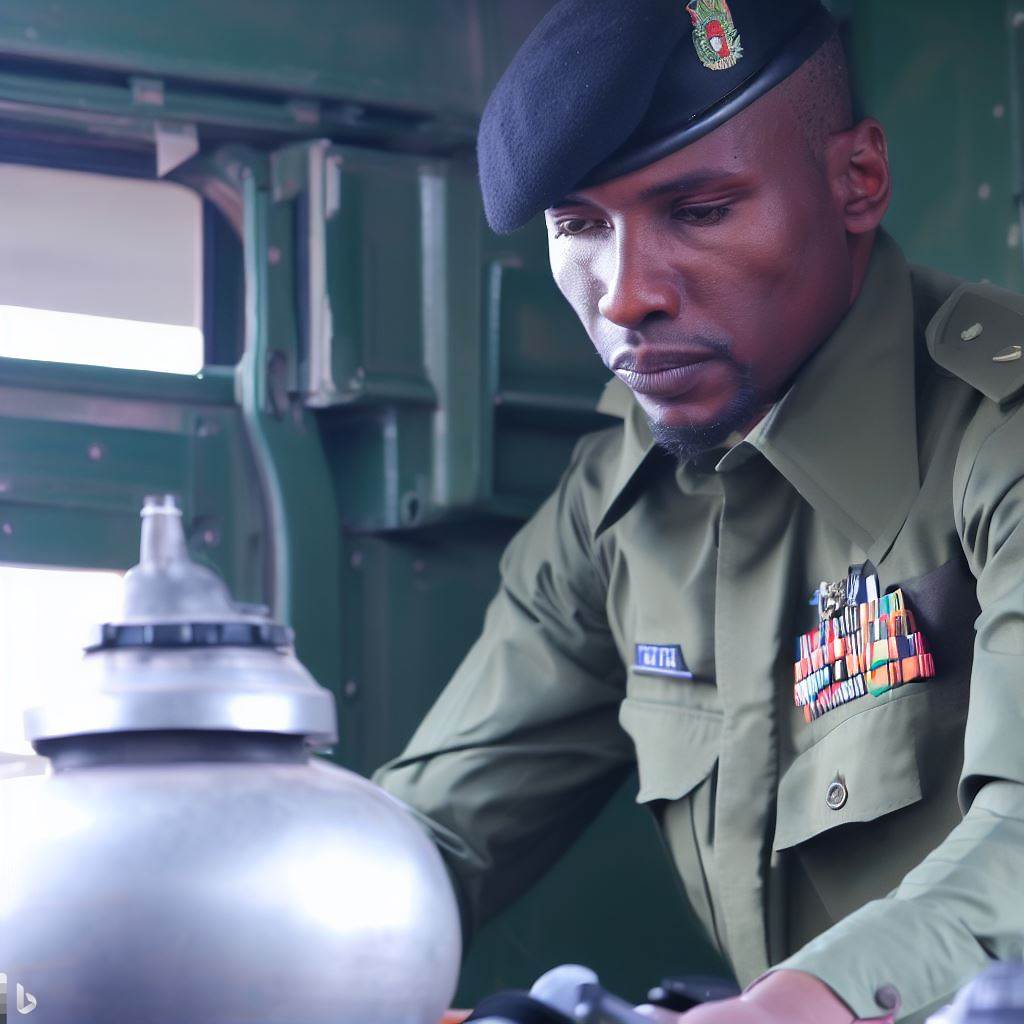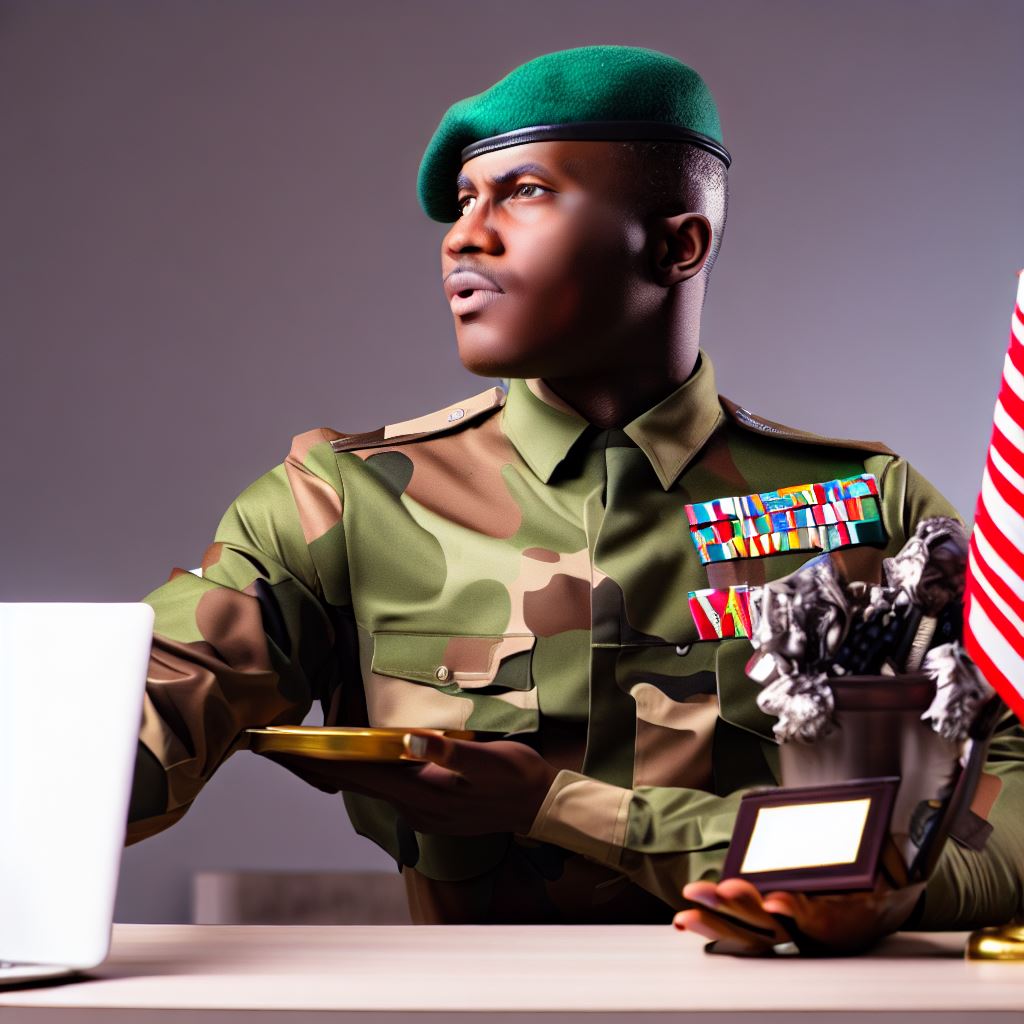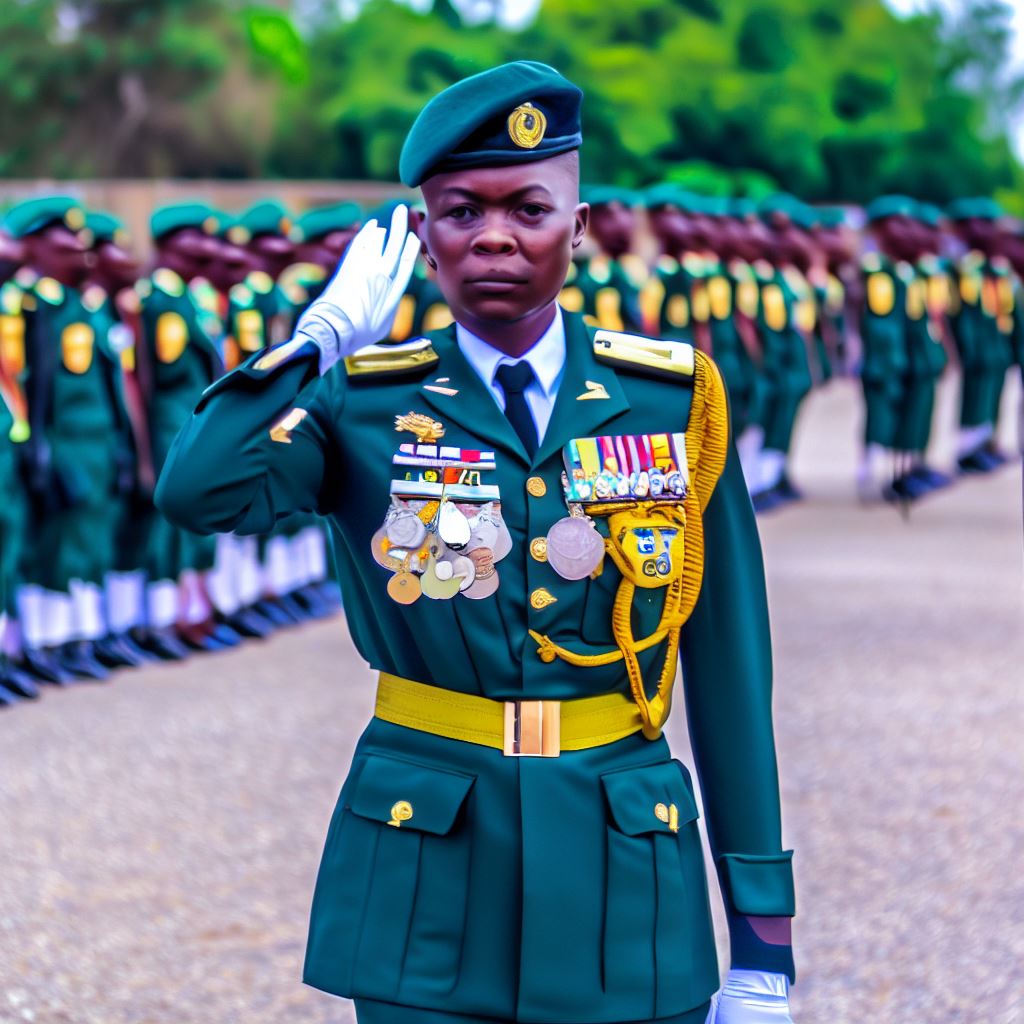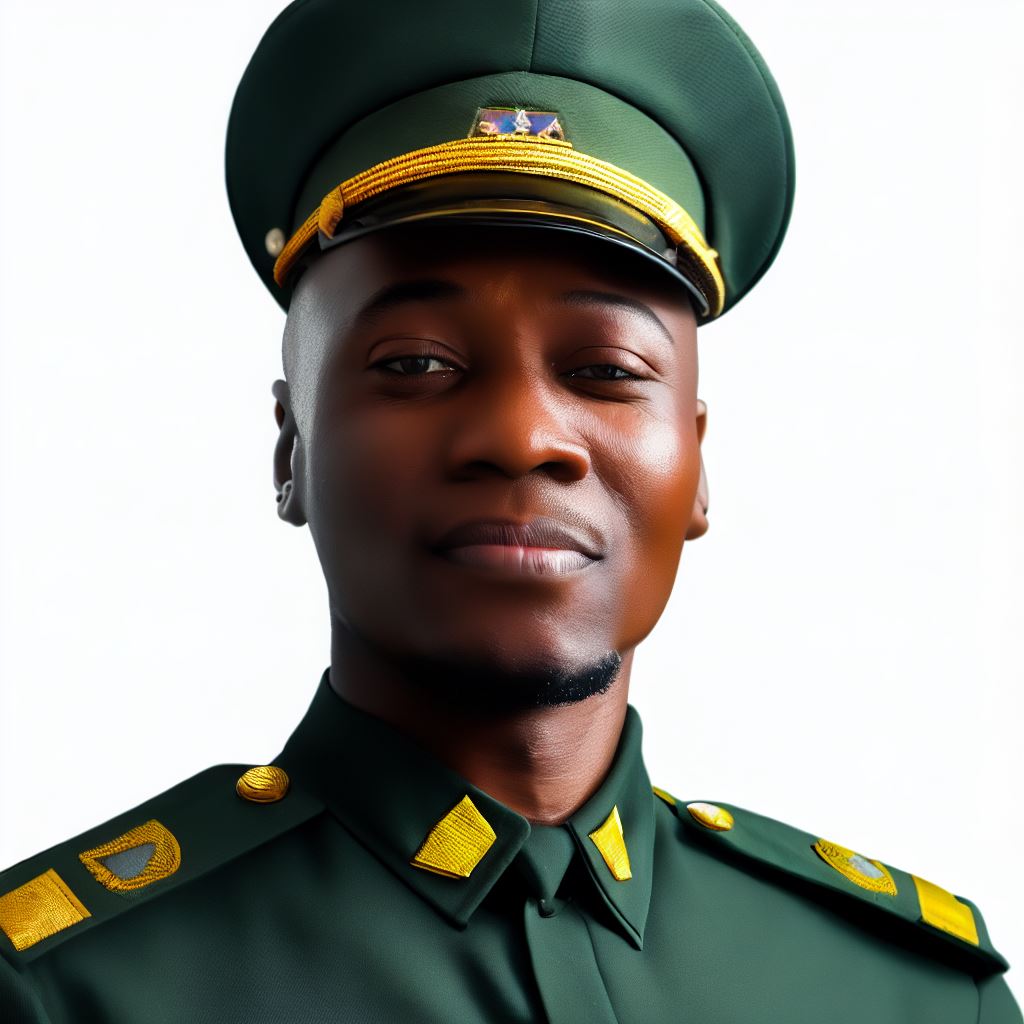Introduction
The Nigerian military officers play a vital role in ensuring peace and security in their country. In this blog post, we aim to provide readers with an inside look into a typical day in the life of a Nigerian military officer.
Our purpose here is to shed light on the duties and responsibilities these brave men and women undertake daily in their selfless dedication to their nation.
Through this blog, readers will gain a deeper understanding of the sacrifices made by Nigerian military officers in their pursuit of safeguarding their country.
Join us as we delve into the daily routines, challenges, and triumphs experienced by these remarkable individuals who put their lives on the line for the greater good.
Through their commitment, discipline, and unwavering determination, they embody the virtues and spirit of the Nigerian armed forces.
In the following sections, we will explore various aspects of a Nigerian military officer’s routine, from physical training exercises to intelligence gathering and strategic planning.
We will also touch upon their involvement in peacekeeping missions, humanitarian efforts, and community outreach programs.
Prepare to embark on a journey that will allow you to appreciate the dedication and sacrifices of these extraordinary men and women who serve as the guardians of Nigeria’s security.
Their commitment to their country is truly an inspiration, and we hope that through this blog post, readers will gain a newfound respect and admiration for the Nigerian military officers.
Overview of Nigerian military
Brief overview of the Nigerian military, including its branches and responsibilities
The Nigerian military is composed of three branches: the Nigerian Army, Nigerian Air Force, and Nigerian Navy.
- Nigerian Army: The Nigerian Army is responsible for land warfare operations and the protection of Nigeria’s territory from external aggression.
- Nigerian Air Force: The Nigerian Air Force is tasked with aerial operations, including air defense, air superiority, and air support for ground troops.
- Nigerian Navy: The Nigerian Navy is responsible for naval operations, safeguarding Nigeria’s maritime interests, and protecting its territorial waters.
The role of the military in Nigeria’s security and defense
The Nigerian military plays a crucial role in ensuring the security and defense of Nigeria.
- Counter-insurgency operations: The military is engaged in ongoing counter-insurgency operations, primarily against Boko Haram in the Northeast region.
- International peacekeeping: Nigeria contributes troops to various United Nations peacekeeping missions, assisting in conflict resolution and maintaining stability in different regions.
- Internal security: The military supports the Nigeria Police Force in maintaining internal security and combating criminal activities like kidnapping, armed robbery, and communal clashes.
- Border security: The military guards Nigeria’s borders, preventing the illegal influx of arms, drugs, and trafficking of goods and persons.
- Emergency response and disaster management: In times of natural disasters or emergencies, the military provides assistance and relief to affected areas, ensuring the safety and well-being of citizens.
- Safeguarding national assets: The military ensures the protection of critical national assets such as oil installations, power plants, and dams, against threats and sabotage.
The significance of the military in Nigeria’s security and defense
The Nigerian military’s significance in Nigeria’s security and defense cannot be overstated.
- Preserving sovereignty: The military defends Nigeria’s sovereignty by protecting its borders, airspace, and maritime territory from external threats.
- Maintaining stability: By actively participating in peacekeeping missions, the military contributes to regional stability and enhances Nigeria’s reputation globally.
- Combating terrorism: The military’s efforts in counter-insurgency operations are crucial in combating terrorism and preserving national unity and peace.
- Promoting economic growth: A secure environment provided by the military encourages foreign investment, economic growth, and development in Nigeria.
- Deterrence: The presence and capability of the Nigerian military act as a deterrent, dissuading potential aggressors from threatening Nigeria’s security.
In essence, the Nigerian military, consisting of the Nigerian Army, Nigerian Air Force, and Nigerian Navy, undertakes diverse responsibilities to ensure Nigeria’s security and defense.
It actively engages in counter-insurgency operations, international peacekeeping, internal security, and border control.
The military’s significance lies in preserving sovereignty, maintaining stability, combating terrorism, promoting economic growth, and serving as a deterrent.
Read: Technological Advances in Bomb Disposal in Nigeria
Recruitment and Training Process
Requirements and Qualifications to Become a Nigerian Military Officer
- Nigerian citizenship and a minimum age of 18 years are mandatory.
- Applicants must possess a minimum of five credits, including English and Mathematics, in WASSCE or NECO.
- Candidates should have a valid means of identification, such as a National ID Card or a valid International Passport.
- Medical fitness assessments are conducted to ensure applicants are physically and mentally capable of performing military duties.
- Good character recommendation letters from reputable individuals or institutions are essential.
Upon meeting the requirements, candidates embark on a comprehensive selection process, commencing with a written examination.
The Rigorous Training Process for Aspiring Officers
- Successful candidates proceed to the Nigerian Defense Academy (NDA) for rigorous physical and mental training.
- The training includes military drills, physical fitness exercises, combat skills, leadership development, and academic courses.
- Aspiring officers are subjected to intensive physical challenges to test their endurance, stamina, and mental resilience.
- They undergo specialized training in various military disciplines, including infantry, artillery, engineering, and intelligence.
- The training process instills discipline, teamwork, patriotism, and a strong sense of duty in the aspiring officers.
- Trainees are constantly evaluated through assessments, examinations, physical fitness tests, and practical exercises.
- The training duration is typically four years for officer cadets, during which they obtain a Bachelor’s degree in a chosen field.
- Practical exercises simulate real-life scenarios to prepare the officers for the challenges they may face in the field.
- Ethical and moral values are emphasized to ensure the officers conduct themselves with integrity and adhere to military principles.
- Continuous personal development programs are provided to enhance the officers’ skills throughout their military careers.
- The training process extends beyond physical and academic aspects to foster mental resilience needed during combat situations.
- At the end of their training, successful cadets are commissioned into the Nigerian Army, Navy, or Air Force, based on specialization.
- Trained officers may pursue further education to obtain advanced degrees and take up higher positions within the military.
- In short, becoming a Nigerian military officer requires meeting specific requirements and undergoing rigorous training.
- The selection process and training aim to develop capable, disciplined, and morally upright individuals who can fulfill their duties with honor and dedication.
Read: How to Apply for Bomb Disposal Jobs in Nigeria
Morning Routine
- Physical Fitness and Morning Drill Exercises: A Nigerian military officer starts their day with rigorous physical fitness activities and morning drill exercises.
- Importance of Physical Fitness: Physical fitness is crucial for military officers as it enhances their endurance, strength, and overall performance during demanding tasks.
- Boosting Mental Alertness: Morning exercise routine not only improves physical health but also boosts mental alertness, enhancing the officer’s overall readiness for the day’s challenges.
- Morning Briefing: After the physical fitness session, the officers gather for the morning briefing, led by their commanding officer.
- Reviewing Operational Plans: During the briefing, the officers discuss the current operational plans, analyze the previous day’s activities, and prepare for the day ahead.
- Allocation of Tasks: The commanding officer assigns specific tasks to each officer based on their expertise and the objectives of the mission.
- Preparing Personal Equipment: Following the briefing, the officers proceed to prepare their personal equipment, ensuring they have everything they need for the day’s activities.
- Weapon Check: A crucial part of the morning routine is the thorough inspection of weapons to ensure they are clean, functioning properly, and ready for use.
- Uniform Inspection: Officers inspect each other’s uniforms to ensure they meet the required standards of cleanliness, neatness, and proper wearing of insignias.
- Personal Hygiene: Maintaining personal hygiene is highly emphasized, and officers spend time freshening up, grooming, and ensuring proper appearance.
- Mission Briefing: Once all preparations are complete, the commanding officer provides a detailed mission briefing, outlining objectives, strategies, and potential challenges.
- Final Check: Before heading out for their assigned duties, officers conduct a final check to ensure they have all necessary equipment and are fully prepared.
Read: Nigeria’s Bomb Disposal Heroes: Notable Individuals
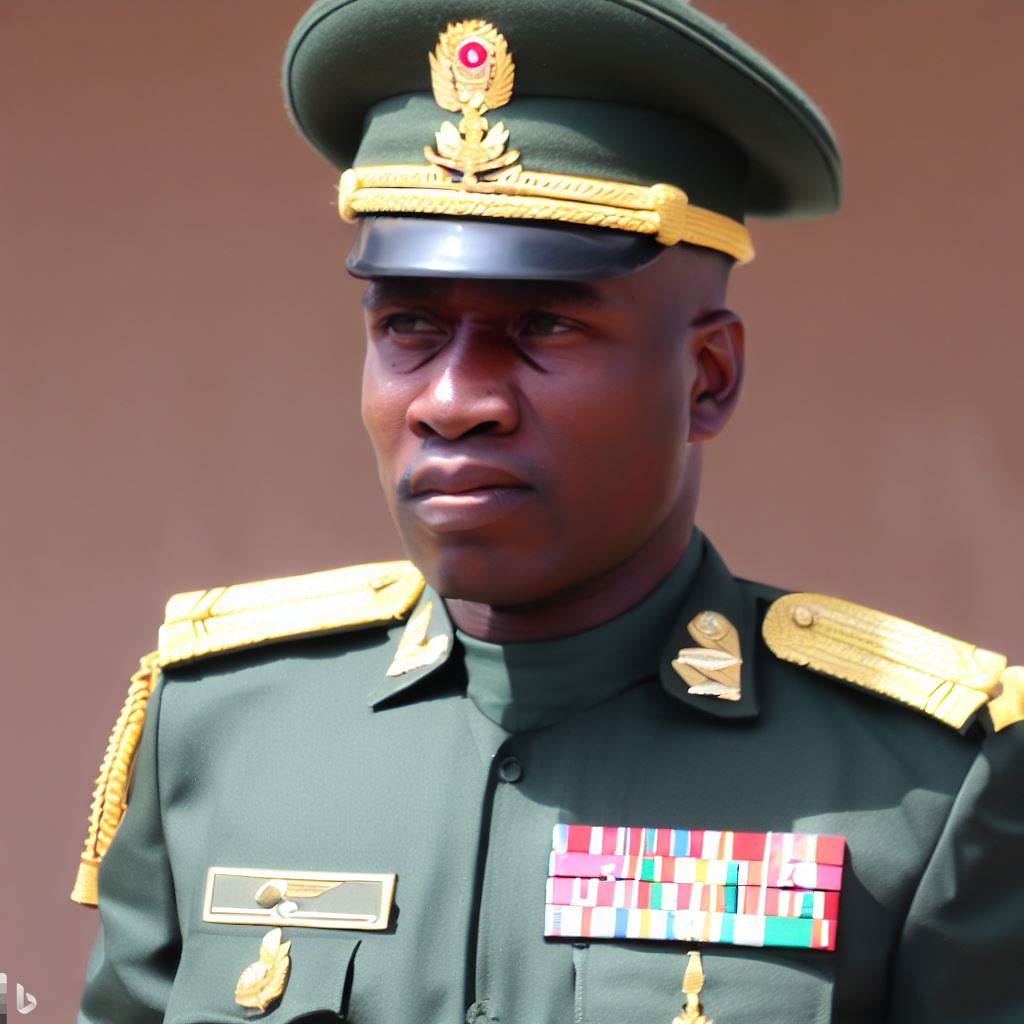
Roles and responsibilities
In this section, we will explore the roles and responsibilities of Nigerian military officers, focusing on the importance of maintaining discipline, integrity, and professionalism.
We will also discuss their involvement in peacekeeping missions, security operations, and combating terrorism.
Various Duties and Responsibilities
- Protection of the country’s territorial integrity and national interests.
- Enforcement of law and order within Nigeria and ensuring the safety of its citizens.
- Participation in joint military exercises and training programs with other countries.
- Assisting the civil authorities during emergencies and natural disasters.
- Maintaining a state of readiness and preparedness in times of conflict or war.
- Training junior military personnel and providing guidance and mentorship.
- Implementing military policies and procedures to ensure the smooth functioning of the armed forces.
- Supervising and inspecting military operations and ensuring strict adherence to operational protocols.
- Keeping abreast of technological advancements and incorporating them into military strategies.
Maintaining Discipline, Integrity, and Professionalism
Discipline, integrity, and professionalism are crucial values for Nigerian military officers. These qualities are essential for effective leadership and ensuring the smooth functioning of the armed forces.
Discipline enables military officers to carry out their duties efficiently and effectively. It promotes obedience to orders, adherence to regulations, and the ability to work as a team.
Maintaining discipline ensures that the military operates cohesively, minimizing errors and maximizing mission success.
Integrity is the foundation of trust within the military and the wider society. Nigerian military officers must be honest, ethical, and accountable for their actions.
Upholding integrity is vital for maintaining public support and confidence in the armed forces.
Professionalism involves demonstrating competence, dedication, and respect in all aspects of military service.
Nigerian military officers are expected to acquire and refine their professional skills throughout their careers. Professional conduct promotes a positive image of the military and strengthens its credibility.
Role in Peacekeeping Missions, Security Operations, and Combating Terrorism
Nigerian military officers play a crucial role in international peacekeeping missions, contributing to global peace and stability.
They provide security, monitor ceasefires, enforce sanctions, and assist in the establishment of democratic institutions in conflict-affected regions.
In addition to peacekeeping, Nigerian military officers are actively involved in various security operations within the country.
They collaborate with other security agencies to combat insurgency, armed robbery, and other forms of criminal activities.
Their presence helps maintain law and order, safeguarding the lives and properties of Nigerian citizens.
Combating terrorism is another critical responsibility bestowed upon Nigerian military officers. They work tirelessly to thwart the activities of extremist groups and protect the country from acts of terrorism.
They conduct intelligence gathering, coordinate operations, and engage in counter-terrorism strategies to ensure the safety of the nation.
In review, Nigerian military officers have diverse duties and responsibilities that contribute to the security and well-being of the nation.
Upholding discipline, integrity, and professionalism is paramount in executing these responsibilities effectively.
Their engagement in peacekeeping missions, security operations, and combating terrorism solidifies Nigeria’s position as a responsible global actor and ensures the peace and stability of the country.
Read: Humanitarian Role of Bomb Disposal in Nigeria
Daily tasks and activities
Being a Nigerian military officer involves a wide range of tasks and activities that they undertake on a daily basis.
These activities are crucial in ensuring the readiness and preparedness of the Nigerian military to tackle various challenges.
Training exercises
One of the key responsibilities of Nigerian military officers is to engage in regular training exercises.
These exercises are designed to enhance their skills, improve teamwork, and test their abilities in various scenarios.
During these exercises, officers undergo physical training, weapon handling drills, and tactical simulations to sharpen their combat skills.
Furthermore, the training exercises also focus on developing leadership abilities and decision-making skills.
Nigerian military officers are trained to analyze situations quickly, assess risks, and make effective decisions under pressure. This training prepares them to lead troops efficiently during deployments and operations.
Equipment maintenance
Military equipment plays a vital role in the effectiveness of Nigerian military operations. Therefore, military officers have the responsibility of ensuring that their equipment is properly maintained.
This includes conducting regular checks, servicing, and repairs of their firearms, vehicles, communication systems, and other essential tools for warfare.
Military officers also undergo specialized training on equipment maintenance, enabling them to troubleshoot and fix any issues that may arise.
By keeping their equipment in optimal condition, these officers can ensure that they are always ready for any situation they may encounter during deployments or combat operations.
Deployments
Nigerian military officers are often deployed to various locations within the country or even abroad to support peacekeeping missions.
During these deployments, officers may be required to work alongside international partners, providing security and humanitarian assistance in conflict zones or areas affected by natural disasters.
While deployed, military officers coordinate with other units, conduct patrols, gather intelligence, and respond to any security threats or emergencies.
Additionally, they may assist local communities by providing medical aid, assisting in infrastructure development, and promoting stability in the region.
Readiness and preparedness
Constant readiness and preparedness are essential for Nigerian military officers. They must always be prepared to respond swiftly and effectively to any crisis or threat.
This includes maintaining physical fitness, staying updated on the latest military tactics and strategies, and continuously honing their skills through training and self-improvement.
Military officers must also stay informed about geopolitical situations, global conflicts, and emerging threats.
This knowledge allows them to analyze potential risks and strategize accordingly.
By staying ready and prepared, military officers can protect and defend their nation’s interests while ensuring the safety and security of its citizens.
Basically, the daily tasks and activities of Nigerian military officers encompass a diverse range of responsibilities.
These officers actively engage in training, equipment maintenance, and deployments, safeguarding their nation’s security and promoting peace.
Challenges and rewards
As Nigerian military officers carry out their duties, they face numerous challenges that require courage, resilience, and commitment.
Serving in the military demands a great deal of sacrifice, not only from the officers themselves but also from their families.
Challenges faced by Nigerian military officers in their line of duty
One of the primary challenges faced by Nigerian military officers is the constant threat to their lives.
They often find themselves in dangerous situations, combating terrorism, insurgency, and other forms of violence.
The risks they encounter on a daily basis are unimaginable, as they navigate through hostile environments, often risking their own safety for the greater good.
Furthermore, being in the military means being away from loved ones for extended periods.
Deployments can last for months or even years, resulting in significant separation from spouses, children, and other family members.
This separation can take a toll on personal relationships, often causing emotional strain and difficulty in maintaining a sense of normalcy in family life.
The risks, sacrifices, and the impact on personal and family life
The impact on personal and family life extends beyond emotional strain. Nigerian military officers must also deal with the physical toll their duties can take on their well-being.
Long hours of demanding physical activity, lack of sleep, and exposure to harsh conditions put significant stress on their bodies.
Enduring such physical challenges requires unwavering determination and dedication to serving their country.
In addition to the challenges faced, there are also numerous rewards that come with being a Nigerian military officer.
Despite the risks and sacrifices, the sense of fulfillment derived from serving the country is immeasurable.
Knowing that they are actively contributing to securing the nation and protecting its citizens gives them a profound sense of purpose.
Rewards and sense of fulfillment derived from serving the country
Nigerian military officers also have the opportunity to develop valuable skills and experience that can benefit them both during and after their service.
Their rigorous training instills leadership, discipline, and problem-solving skills, enabling them to excel in diverse fields.
Moreover, the camaraderie and bond formed with fellow officers create a support system that helps officers endure the challenges they face.
This sense of community and shared purpose fosters a deep sense of loyalty and dedication to their team and the country they serve.
Ultimately, the rewards of being a Nigerian military officer far outweigh the challenges. The pride and honor that comes with protecting and serving the nation cannot be easily quantified.
Knowing that their sacrifices contribute to maintaining peace and security in Nigeria is a source of immense satisfaction and fulfillment.
In a nutshell, Nigerian military officers face numerous challenges in their line of duty, including the constant threat to their lives, separation from their families, and the physical demands of their roles.
However, the rewards, including a sense of purpose, valuable skills, and a strong support system, make the sacrifices worthwhile. Serving the country in this capacity is both a privilege and a noble calling.
Conclusion
Nigerian military officers carry out their duties with utmost dedication and sacrifice. Throughout this blog post, we have highlighted various aspects of a day in the life of these officers.
We discussed how Nigerian military officers are responsible for protecting the nation’s sovereignty and ensuring the safety and security of its citizens.
From training exercises to deployments, they constantly strive to be prepared for any situation that may arise.
Additionally, we explored the various roles that Nigerian military officers undertake, such as leading troops, coordinating operations, and providing humanitarian assistance.
Their abilities to demonstrate leadership, resilience, and adaptability are essential for the success of their missions.
It is crucial to recognize the importance of the Nigerian military and the incredible commitment displayed by its officers.
They put their lives on the line, leaving behind their families and sacrificing their comfort for the greater good of the nation. Their commitment deserves our utmost appreciation and respect.
Through this blog post, we hope to have provided readers with a better understanding and appreciation for the responsibilities and sacrifices of Nigerian military officers.
Their tireless efforts should not go unnoticed, and it is crucial to support and honor their service.
Let us never forget the dedication of these officers and the vital role they play in safeguarding our nation’s peace and security.
It is our responsibility to support them and champion their incredible service for the betterment of Nigeria.

